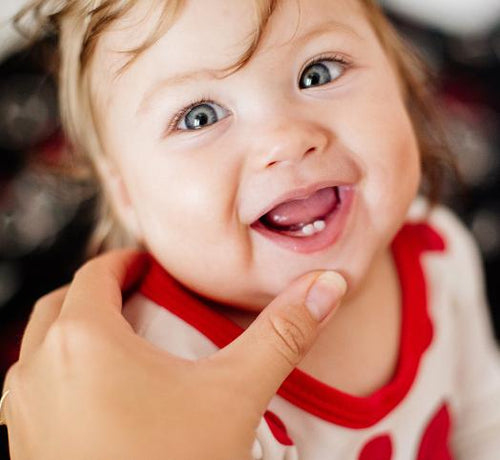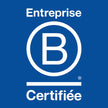The appearance of a baby's first teeth is often an emotional moment for parents, but not always easy for the child!
Pain, profuse salivation, red cheeks... teething is accompanied by a multitude of minor ailments that can be annoying for your baby.
THE ARRIVAL OF THE 1ST TEETH
The appearance of teeth follows a very variable schedule from one child to another.
The first tooth usually emerges before the age of 6 months. However, it can appear as early as 4 months in certain children (or even at birth in exceptional cases).
Conversely, it happens that a 12-month-old baby does not yet have teeth, without this being a sign of poor development if no other anomaly is associated with it.
So be patient... When your baby starts biting his toys hard, sucking his fingers incessantly and drooling profusely, there's a good chance his first tooth will be close by! Teeth almost always appear in the same order in all babies.
Most often, they come out as follows:
Between 6 and 10 months: the lower central incisors.
Between 8 and 12 months: the upper central incisors.
Between 9 and 16 months: the upper and lower lateral incisors.
Between 13 and 24 months: the first premolars.
Between 16 and 23 months: canines.
Between 23 and 33 months: the second premolars.
So, between 2 and a half and 3 years of age, all of your child's 20 baby teeth should have come out.
He will then be quiet until he is around 6 years old, a period when his adorable little baby pearls will begin to fall out to make room for permanent teeth.
THE MAIN SIGNS OF TEETHING
The signs of teething vary from one child to another.
The emergence of a tooth is preceded by a more or less painful inflammation of the gums. The pain is due to the movement of the teeth in the jaw bone, or its passage through the gums. Teething
can also be accompanied by a host of small problems that are not serious, but are sometimes annoying for your baby: Swollen, red and sensitive gums Hypersalivation. This more abundant salivation protects the gums during thrusting.
A red, hot cheek (or both) A grumpy mood: your child may be more irritable than usual and cry more easily Irritation around the mouth A mild fever (below 38°) Disturbed sleep Loss of sleep temporary appetite
However, be careful not to blame everything on teething: if they are indeed linked to the emergence of a tooth, all these symptoms should fade quickly. A fever above 38°C, pain that seems too severe, diarrhea, vomiting or a gray complexion should not be attributed to the teeth: if you have the slightest doubt, consult your doctor.
SMALL, SIMPLE ACTION TO RELIEVE BABY
Comfort and cuddle him. Consider massaging his whole body.
This will relieve him, your caresses making him forget his pain. Gently and regularly wipe his face with a clean cloth. This will help prevent irritation due to saliva.
Offer him a teething ring, clean, without liquid, that he can bite as he pleases. Some can be refrigerated beforehand (but not frozen), the cold being interesting due to its slightly anesthetic power. Massage his gums gently with a perfectly washed finger, or with a clean, damp cloth. Give him cold dishes appropriate for his age (compotes, yogurts, etc.)
AND OTHERS TO AVOID
Do not apply numbing products as they are dangerous. Baby can swallow them and they can reduce the swallowing reflex which allows him to swallow. Do not give him raw vegetables or fruits to bite, which could get stuck in his throat. Avoid using a teething necklace (amber necklace type). Teething biscuits are not recommended because they do not provide relief and contain sugar which can cause cavities. Finally, forget grandmother's tips: never pierce your baby's gum to help the tooth come out. Do not rub it with alcohol or sugar to help break through.
WHEN SHOULD YOU CONSULT A DOCTOR?
If the pain is too severe, if your child's temperature is above 38°5C, if your baby has other symptoms or does not seem to be in his usual state, you are strongly advised to consult your doctor.
He or she will be able to prescribe a soothing balm that you will use to massage your baby's gums, or even a homeopathic preparation.




